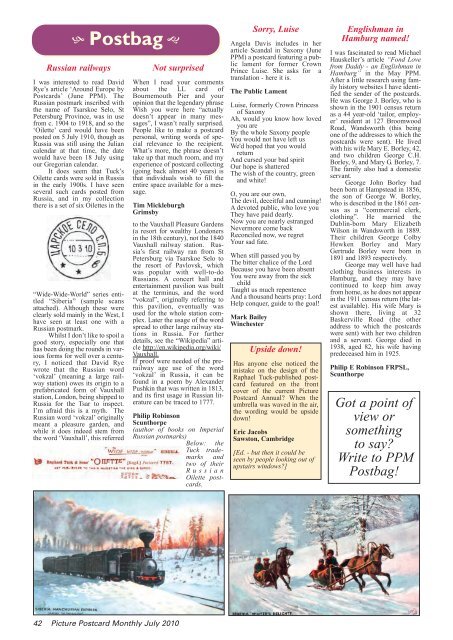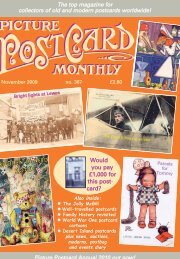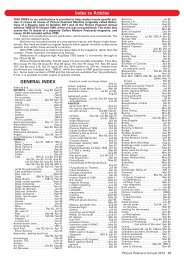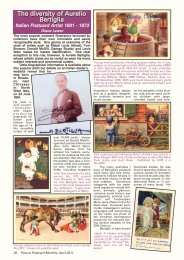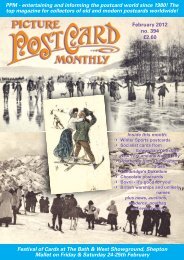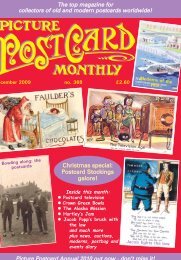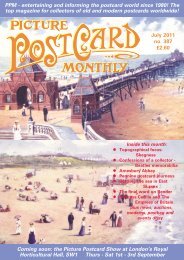PPM revisits Manchester's Belle Vue amusement park - Picture ...
PPM revisits Manchester's Belle Vue amusement park - Picture ...
PPM revisits Manchester's Belle Vue amusement park - Picture ...
Create successful ePaper yourself
Turn your PDF publications into a flip-book with our unique Google optimized e-Paper software.
Postbag <br />
Russian railways<br />
I was interested to read David<br />
Rye’s article ‘Around Europe by<br />
Postcards’ (June <strong>PPM</strong>). The<br />
Russian postmark inscribed with<br />
the name of Tsarskoe Selo, St<br />
Petersburg Province, was in use<br />
from c. 1904 to 1918, and so the<br />
‘Oilette’ card would have been<br />
posted on 5 July 1910, though as<br />
Russia was still using the Julian<br />
calendar at that time, the date<br />
would have been 18 July using<br />
our Gregorian calendar.<br />
It does seem that Tuck’s<br />
Oilette cards were sold in Russia<br />
in the early 1900s. I have seen<br />
several such cards posted from<br />
Russia, and in my collection<br />
there is a set of six Oilettes in the<br />
“Wide-Wide-World” series entitled<br />
“Siberia” (sample scans<br />
attached). Although these were<br />
clearly sold mainly in the West, I<br />
have seen at least one with a<br />
Russian postmark.<br />
Whilst I don’t like to spoil a<br />
good story, especially one that<br />
has been doing the rounds in various<br />
forms for well over a century,<br />
I noticed that David Rye<br />
wrote that the Russian word<br />
‘vokzal’ (meaning a large railway<br />
station) owes its origin to a<br />
prefabricated form of Vauxhall<br />
station, London, being shipped to<br />
Russia for the Tsar to inspect.<br />
I’m afraid this is a myth. The<br />
Russian word ‘vokzal’ originally<br />
meant a pleasure garden, and<br />
while it does indeed stem from<br />
the word ‘Vauxhall’, this referred<br />
Not surprised<br />
When I read your comments<br />
about the LL card of<br />
Bournemouth Pier and your<br />
opinion that the legendary phrase<br />
Wish you were here “actually<br />
doesn’t appear in many messages”,<br />
I wasn’t really surprised.<br />
People like to make a postcard<br />
personal, writing words of special<br />
relevance to the recipient.<br />
What’s more, the phrase doesn’t<br />
take up that much room, and my<br />
experience of postcard collecting<br />
(going back almost 40 years) is<br />
that individuals wish to fill the<br />
entire space available for a message.<br />
Tim Mickleburgh<br />
Grimsby<br />
to the Vauxhall Pleasure Gardens<br />
(a resort for wealthy Londoners<br />
in the 18th century), not the 1840<br />
Vauxhall railway station. Russia’s<br />
first railway ran from St<br />
Petersburg via Tsarskoe Selo to<br />
the resort of Pavlovsk, which<br />
was popular with well-to-do<br />
Russians. A concert hall and<br />
entertainment pavilion was built<br />
at the terminus, and the word<br />
“vokzal”, originally referring to<br />
this pavilion, eventually was<br />
used for the whole station complex.<br />
Later the usage of the word<br />
spread to other large railway stations<br />
in Russia. For further<br />
details, see the “Wikipedia” article<br />
http://en.wikipedia.org/wiki/<br />
Vauxhall.<br />
If proof were needed of the prerailway<br />
age use of the word<br />
‘vokzal’ in Russia, it can be<br />
found in a poem by Alexander<br />
Pushkin that was written in 1813,<br />
and its first usage in Russian literature<br />
can be traced to 1777.<br />
Philip Robinson<br />
Scunthorpe<br />
(author of books on Imperial<br />
Russian postmarks)<br />
Below: the<br />
Tuck trademarks<br />
and<br />
two of their<br />
Russian<br />
Oilette postcards.<br />
Sorry, Luise<br />
Angela Davis includes in her<br />
article Scandal in Saxony (June<br />
<strong>PPM</strong>) a postcard featuring a public<br />
lament for former Crown<br />
Prince Luise. She asks for a<br />
translation - here it is.<br />
The Public Lament<br />
Luise, formerly Crown Princess<br />
of Saxony<br />
Ah, would you know how loved<br />
you are<br />
By the whole Saxony people<br />
You would not have left us<br />
We'd hoped that you would<br />
return<br />
And cursed your bad spirit<br />
Our hope is shattered<br />
The wish of the country, green<br />
and white!<br />
O, you are our own,<br />
The devil, deceitful and cunning!<br />
A devoted public, who love you<br />
They have paid dearly.<br />
Now you are nearly estranged<br />
Nevermore come back<br />
Reconciled now, we regret<br />
Your sad fate.<br />
When still passed you by<br />
The bitter chalice of the Lord<br />
Because you have been absent<br />
You were away from the sick<br />
child<br />
Taught us much repentence<br />
And a thousand hearts pray: Lord<br />
Help conquer, guide to the goal!<br />
Mark Bailey<br />
Winchester<br />
Upside down!<br />
Has anyone else noticed the<br />
mistake on the design of the<br />
Raphael Tuck-published postcard<br />
featured on the front<br />
cover of the current <strong>Picture</strong><br />
Postcard Annual? When the<br />
umbrella was waved in the air,<br />
the wording would be upside<br />
down!<br />
Eric Jacobs<br />
Sawston, Cambridge<br />
[Ed. - but then it could be<br />
seen by people looking out of<br />
upstairs windows?]<br />
Englishman in<br />
Hamburg named!<br />
I was fascinated to read Michael<br />
Hauskeller’s article “Fond Love<br />
from Daddy - an Englishman in<br />
Hamburg” in the May <strong>PPM</strong>.<br />
After a little research using family<br />
history websites I have identified<br />
the sender of the postcards.<br />
He was George J. Borley, who is<br />
shown in the 1901 census return<br />
as a 44 year-old ‘tailor, employer’<br />
resident at 127 Broomwood<br />
Road, Wandsworth (this being<br />
one of the addresses to which the<br />
postcards were sent). He lived<br />
with his wife Mary E. Borley, 42,<br />
and two children George C.H.<br />
Borley, 9, and Mary G. Borley, 7.<br />
The family also had a domestic<br />
servant.<br />
George John Borley had<br />
been born at Hampstead in 1856,<br />
the son of George W. Borley,<br />
who is described in the 1861 census<br />
as a “commercial clerk,<br />
clothing”. He married the<br />
Dublin-born Mary Elizabeth<br />
Wilson in Wandsworth in 1889.<br />
Their children George Colby<br />
Hewken Borley and Mary<br />
Gertrude Borley were born in<br />
1891 and 1893 respectively.<br />
George may well have had<br />
clothing business interests in<br />
Hamburg, and they may have<br />
continued to keep him away<br />
from home, as he does not appear<br />
in the 1911 census return (the latest<br />
available). His wife Mary is<br />
shown there, living at 32<br />
Baskerville Road (the other<br />
address to which the postcards<br />
were sent) with her two children<br />
and a servant. George died in<br />
1938, aged 82, his wife having<br />
predeceased him in 1925.<br />
Philip E Robinson FRPSL,<br />
Scunthorpe<br />
Got a point of<br />
view or<br />
something<br />
to say?<br />
Write to <strong>PPM</strong><br />
Postbag!<br />
42 <strong>Picture</strong> Postcard Monthly July 2010


